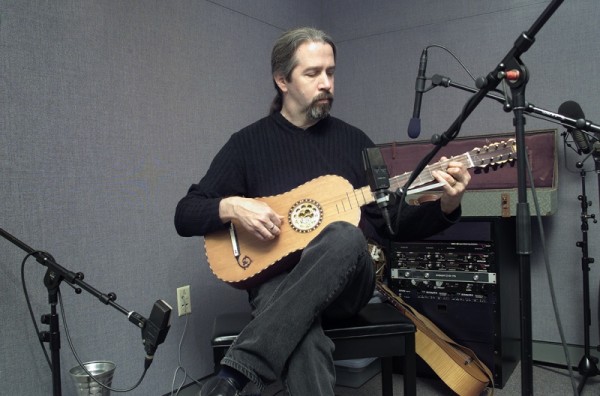
Lee Welch records a song in the Colonial Williamsburg Foundation studio for the CD, “A Grand Entertainment.”
It began in 1968 with a recording of “A Candlelight Concert at the Governor’s Palace.”
The 18th-century music performance by the Governor’s Palace Orchestra was available in as a 33 1/3 album – monaural or stereo – and could be purchased for $3.95. More than 13,000 albums were sold.
“In an effort to create as authentic an atmosphere as possible, the album was recorded in the candlelit Governor’s Palace and such superfluous noises as the pumping of the bureau organ, the turning of pages, and perhaps a little foot-tapping by one of the musicians has been left in deliberately,” according to a press release announcing the first release of a high-fidelity recording under the Colonial Williamsburg Foundation’s own label.
MUSIC
You can see the catalogue of all the music available on CDBaby.com on our Music page.
“I’ll appreciate comments and suggestions for we are in the midst of doing a second recording of Military Music for the American Revolution,” said the promotional material that accompanied the first recording.
In fact, the recordings of the concert and military music of the Fifes and Drums was just the beginning. Since then, the Foundation has released all kinds of music. “Music programming has been an important part of the Foundation since the ‘50s,” said William G. Wagner, Executive Producer and Director of Media Services for Colonial Williamsburg.
Vinyl record albums gave way to cassette tapes and now, Colonial Williamsburg’s music can be downloaded to your phone or other personal device from the online music store CD Baby.
“The amount of people buying CDs is dwindling,” Wagner said. “The expense of creating a CD has become prohibitive.”
“To preserve the music collection and create new pieces, we had to go with some type of digital download.”
Colonial Williamsburg’s musical legacy includes compilations of Colonial Williamsburg’s Fife and Drum Corp and a commemoration of the Bicentennial with liberty songs recorded with members of the Bruton Parish Choir.
The Governor’s Musick also has performed selections from Thomas Jefferson’s own music library in “A Delightful Recreation – The Music of Thomas Jefferson.”
“There was a real push in the 60s and 70s to get out a lot of music,” said Jane Hanson, a member of that 18th-century musical ensemble. She sang on the recording of “A Delightful Recreation,” and has since been the producer on a number of Foundation recordings.
Christmas music and the tunes of the fifes and drums are perennial favorites, she says.
The push continued in the 1980s, when baroque instrumental and vocal music was celebrated in “A Gentlewoman’s Pursuit.” That collection belonged to an 18th-century Williamsburg resident – it was discovered in bound volumes in the Earl Gregg Swen Library’s rare-book selection at the College of William & Mary.
And “Nottingham Ale” reminded us that 18th-century taverns were places for ballads, jigs and drinking songs.
In recent months, 15 existing recordings have been digitized and are available on CDBaby.com. Colonial Williamsburg recordings can be downloaded in their entirety or as favorite individual selections.
Two strictly digital pieces have recently been added, including “With Flute and Friends,” which went on sale today. In it, flutist and arranger Herb Watson introduces a type of music that we’re still discovering because of a scarcity of primary sources on the subject – 18th-century folk music that was particularly popular among the lower and middle classes of the period.
“Upon a Viol at Sea,” which features Governor’s Musick member Wayne Moss playing the viola da gamba, is also new to the collection. Moss notes that viols differ from violins, in part, because they’re more lightly constructed and strung. In chamber music, however, the unique character of the viol was exploited by numerous composers throughout the 16th, 17th, and 18th centuries,” he said.
Both performances were recorded at the Raleigh Tavern, Wagner said, because both musicians insisted that the atmosphere was perfect for the music.
The original recording of “A Candlelight Concert at the Governor’s Palace” never made it to CD.
“But maybe now we could revisit it,” Wagner said. “We could clean it up and digitize it, and make it available again.”
Leave a Reply